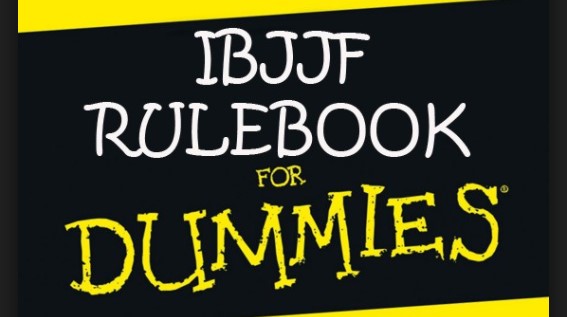
When it comes to competition, the IBJJF is the leading Brazilian Jiu-Jitsu organization in the world. Standing for the International Brazilian Jiu Jitsu Federation, it’s been responsible for competitive events across the globe.
The IBJJF is a product of Carlos Gracie Jr. who is the head of Gracie Barra, one of the most widespread BJJ associations. Organizing tournaments for more than 20 years, it is the leading organization of its kind.
Some of the greatest competitions in the world of Jiu-Jitsu are held by the IBJJF. The likes of The Mundials, The Europeans, The Brazilian Nationals, and the Pan Ams have grown to be the most prestigious tournaments available. Those who manage to score high in these tournaments have rocketed up the official rankings. So, as it seems, the IBJJF is a flawless organization working for the good of the sport.
Source of Controversy
In truth, things are way more complicated than they may seem. First and foremost, the IBJJF is a for-profit organization that does not pay competing athletes any monetary prizes. This approach is acceptable when it comes to the lower tiers of competitors, but at black belt level it’s different.
During the last few years we’ve borne witness to the rise of professional Jiu-Jitsu and it’s getting huge. Events like EBI, Polaris, WNO, ADCC, and CJI have been in full swing lately, the last one awarding winning athletes with $1.000.000.
In stark contrast to the IBJJF, these organizations pride themselves in promoting professional Jiu-Jitsu, where athletes are paid for their efforts. This causes a rift with the IBJJF, whose modus operandi is to require an entrance fee for all competitors.
So, on one hand, it is the professional Jiu-Jitsu scene, offering money but not as widespread exposure, particularly for Gi athletes. On the other, it’s the IBJJF conglomerate, demanding money to compete and not giving anything back to athletes.
The second eye-glaring problem with the IBJJF is its incredibly restrictive rule set. Apart from the questionable points systems, the submission limitations have been a huge source of negative feedback. Back in the days of its global domination, the IBJJF’s approach was tolerated, given the lack of competition from other organizations.
Since then, however, things have changed. People started frowning upon the impractical point system claiming that it was killing the spirit of Jiu-Jitsu. Winning a match on advantages (a still unclear concept for most competitors) or by referee’s decision became the norm. Submissions have been severely restricted, even at the elite level, with no logical explanation as to why.
Let’s dig a little deeper into IBJJF rules and the pitfalls they might lead to for those who decide to compete.
A Few Rule Set “Traps” of the IBJJF
The IBJJF rule book is a 52-page long manual that is available online. It outlines the seemingly never-ending array of BJJ competition rules in detail, with the help of an exorbitant amount of pictures. However, even when carefully read, this manual fails to outline some of the most inconspicuous and controversial BJJ rules.
These are not just insignificant BJJ rules, but decisions that might change the outcome of a match. Competing athletes have to be aware of these BJJ rules, regardless of how misleading and confusing they might be.
1. Stalling
Stalling is probably the most frowned upon strategy in high-level Jiu-Jitsu and for a good reason. Keeping someone in a position that will result in you beating them by a single advantage is not the Jiu-Jitsu way.
Agreed, BJJ is all about control, but it is the type of control that leads to submission. Grappling arts like Judo and wrestling emphasize holding/pinning the opponent to win, but BJJ is more dynamic. Once you hit the ground it should be about going up the food chain to get the tap.
IBJJF rules state that you can’t keep someone in your closed guard without attacking and penalties will be awarded accordingly. Four penalties mean you get disqualified. The same goes for being stuck in the closed guard of an opponent. Staying there until time runs out will earn you penalties.
But there is a “loophole”. If you get to the mount position or the back, you can stay there indefinitely. The logic of the IBJJF is that those are the most dominant positions and you can’t get to a better one. This often results in boring matches, especially with the Gi.
2. Passing Trickery
The idea behind a pass in BJJ is to bypass the opponent’s legs in order to gain a dominant position. In an IBJJF tournament getting to side control will result in 3 points for the guard passer.
However, keep in mind that side control, as a position does not yield any points. The 3 points you get when you get there most times stem from the pass, not the position itself. Getting to the back, or mount, though, will earn you an extra 4 points each on top of the 3 positions you get for passing the legs.
Also under the IBJJF rules, if your opponent sits down you are obligated to engage and pass the guard. If you decide to back away in order to force them to follow you up you will get penalized.
3. Sweeping Conundrums
A sweep is worth two points in the world of IBJJF tournaments. Any motion that allows you to reverse the bottom position and get on top of your opponent is considered a sweep.
Well, sort of. If you manage to reverse bottom side control or bottom mount, you won’t get anything for your efforts. A sweep has to involve the legs during the reversal, in order to merit full points. This limits you to getting points only from guard or half guard.
If you end up on your feet while attempting to sweep someone and you get thrown down in the process, you won’t lose any points. Just make sure that you land in guard. The logic behind this one is that points will not be awarded for putting you in a position you were already in.
In a funny twist of events, these Jiu-Jitsu rules allow you to actually sweep yourself. Yes, you read that right. Whenever you’re attempting to pass someone’s guard and you decide to sit back, allowing them to end up on top, they get the points.
A sweep doesn’t have to originate from the opponent, it can be initiated by yourself as well. So be careful when you decide to sit back for ankle locks in an IBJJF match.
4. Mat Space
Getting off the mats while engaged in a match will result in the referee resetting both opponents in the middle. However, if one athlete is caught in a submission and decides to leave the mat carrying their opponent, it’s all over. No penalties are awarded, it is a straight DQ.
Remember though, that you’ll only get disqualified if you leave on purpose. If you end up outside the mat space while escaping a sub, you will be reset, but the opponent is going to get 2 points.
You can also earn a DQ even before you step on the mats. Apart from having to be on weight, make sure your Gi is up to IBJJF standards.
If you’ve already competed in one of their events you already know the drill. Sleeve length, sleeve width, and the state of your belt all undergo examination before you’re allowed on the mats. You should also make sure your Gi is either white, blue, or black, or you’ll be asked to replace it.
5. Manipulating the Point System
Remember those advantages that make everyone lose their minds? Well, those pesky little things are the tipping factor that decides most matches under these BJJ rules. They also contribute to lots of matches being boring beyond comprehension.
The trick with advantages is that they only matter if you’re all square on points. If you have just one point more than your opponent and they have 10 advantages, you’ll walk away with the win. All things equal though, advantages will determine the outcome.
If no points or advantages have been awarded, it’s down to who has been misbehaving. Whoever has more penalties is going to lose the match. And in the occasion that nothing significant happened during the match it will be down to the referee to decide who wins. Their decision is going to be based on those infamous advantages again – but this time by deciding who got closer to getting one.
6. Match Behavior
During a BJJ match, both competitors are not allowed to talk to the referee or among themselves. Arguing decisions with the ref will earn you a penalty at least. The same goes for any verbal exchanges with the opponent. Having a penalty like that decides a match is a cruel and unusual way to lose.
Keep in mind that you should keep your belt tidily tied as much as possible. The ref can stop a match and ask competitors to redo their GIs and belts. However, this is not a time intended to give you a break. Unless you want to get a penalty, don’t spend more than 20 seconds readjusting your belt.
The IBJJF seems to struggle with the rise of Jiu-Jitsu in general and the professional scene in particular. Submission-only events with no restrictions and longer or no time limits at all are taking the mantle.
Yet, IBJJF tournaments still carry weight. They are a great place to compete for most people, excluding elite black belts. There’s still great opposition at their largest events and lots of tough matches. Despite the hefty entrance fee and lack of any cash prizes, IBJJF tournaments are a great way of gaining experience. Just make sure you’re aware of all the rule tricks surrounding this type of event.
Gaming The System
Knowing the rules of the tournament you compete in is one of the first things to consider before signing up. Having a deeper understanding of the finer aspects of the rulebook is not only going to keep you from conceding a match in ways that don’t make much sense but will actually help you force your opponent into these situations and win. While not the most glorious way to in, a victory is still a victory, right? Just ask the IBJJF!
How To Prepare For Your First BJJ Tournament and Maximize Your Chances of Winning it
Medals Without Winning in Tournament and People Who Praise about Their “Success” on Social Media


![Darce Choke Encyclopedia – Origins, Mechanics and Variations [2025] BJJ, choke, Brabo, BJJ Darce Choke, D'arce Choke, Darce BJJ Choke](https://bjj-world.com/wp-content/uploads/2017/11/JungPoirierLeeYahoo-218x150.jpg)






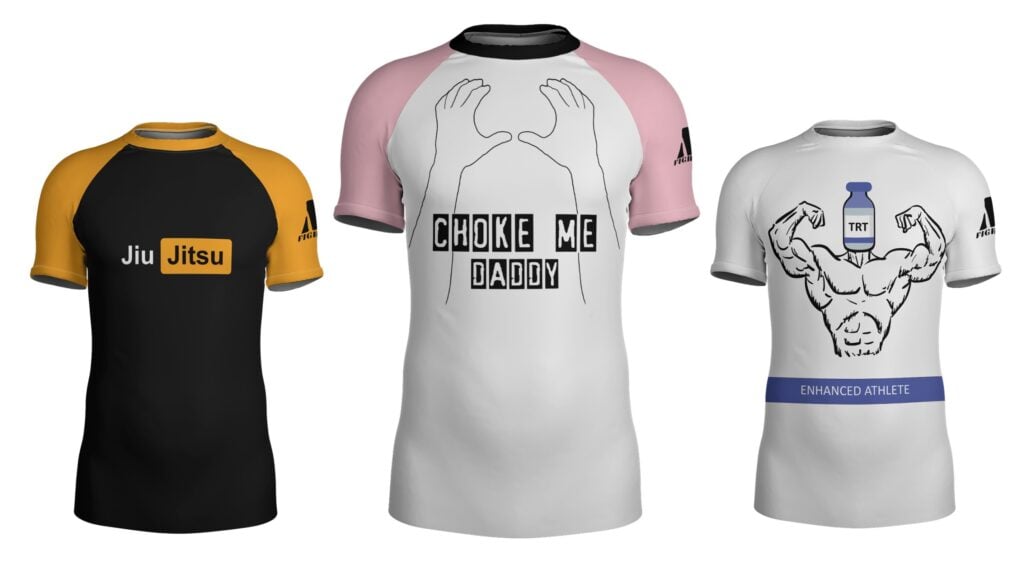
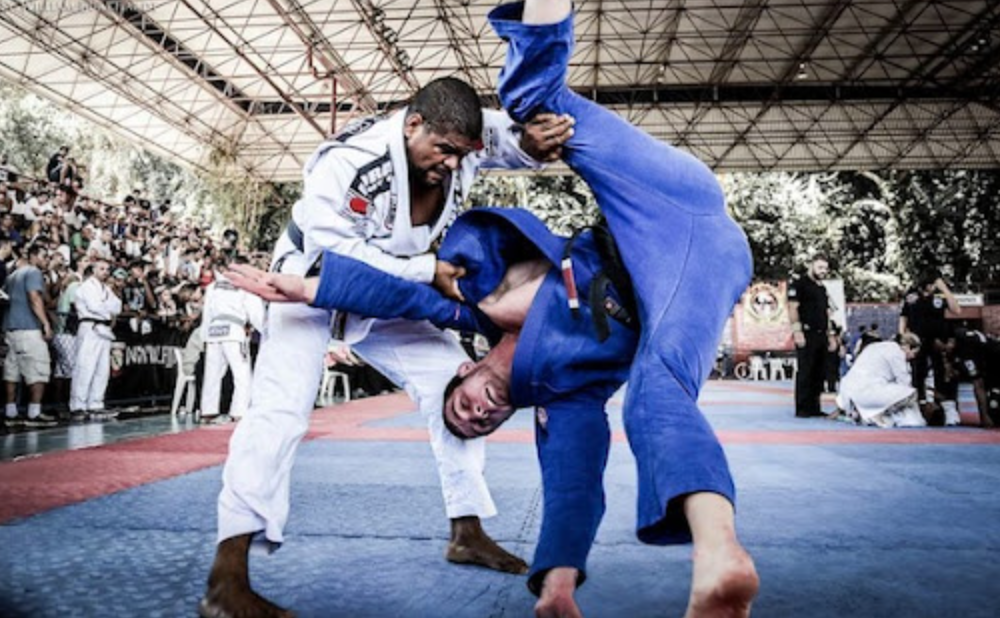
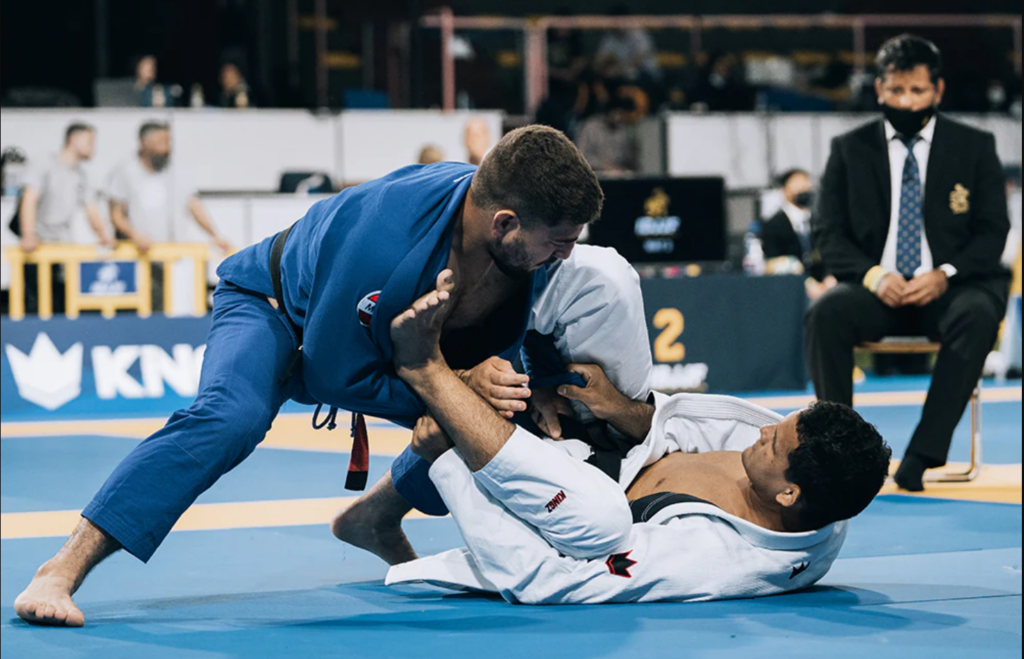

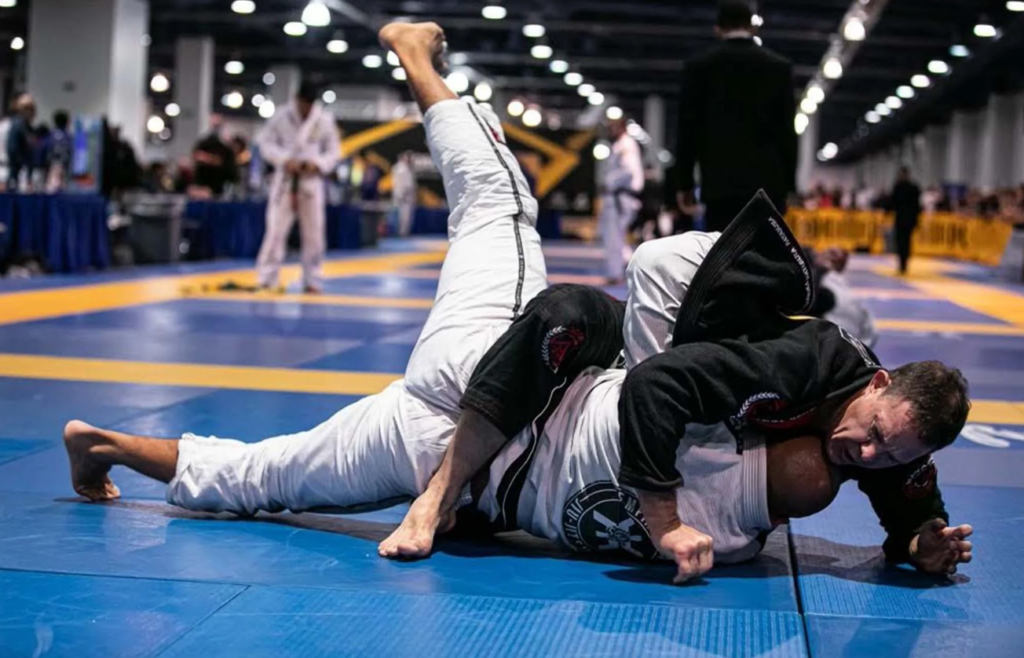



![Slicin’ Calves Mikey Musumeci DVD Review [2025] Slicin' Calves Mikey Musumeci DVD Review](https://bjj-world.com/wp-content/uploads/2025/04/slicin-calves-mikey-musumeci-dvd-review-218x150.png)
![Jiu-Jitsu For Old Guys Guard Retention Bernardo Faria DVD Review [2025] Jiu-Jitsu For Old Guys Guard Retention Bernardo Faria DVD Review](https://bjj-world.com/wp-content/uploads/2025/03/old-guys-guard-retention-bernardo-faria-dvd-review-218x150.png)
![X-Guard Trickery Kyle Sleeman DVD Review [2025] X-Guard Trickery Kyle Sleeman DVD Review](https://bjj-world.com/wp-content/uploads/2025/03/x-guard-trickery-kyle-sleeman-dvd-review-218x150.png)
![Countering with Crab Ride Anthony Budion DVD Review [2025] Countering with Crab Ride Anthony Budion DVD Review](https://bjj-world.com/wp-content/uploads/2025/03/countering-with-crab-ride-anthony-budion-dvd-review-218x150.png)
![Closet Closed Guard Craig Jones DVD Review [2025] Closet Closed Guard Craig Jones DVD Review](https://bjj-world.com/wp-content/uploads/2025/03/closet-closed-guard-craig-jones-dvd-review-218x150.png)
![360 Degrees Guard Retention Thiago Abud DVD Review [2024] 360 Degrees Guard Retention Thiago Abud DVD Review](https://bjj-world.com/wp-content/uploads/2024/10/360-degrees-guard-retention-thiago-abud-dvd-review-324x235.png)
![Crush The Guard Vagner Rocha DVD Review [2024] Crush The Guard Vagner Rocha DVD Review](https://bjj-world.com/wp-content/uploads/2024/10/crush-the-guard-vagner-rocha-dvd-review-100x70.png)




![Intro To Hip Mobility for Guard Players Joshua Presley DVD Review [2024] Intro To Hip Mobility for Guard Players Joshua Presley DVD Review](https://bjj-world.com/wp-content/uploads/2024/09/hip-mobility-for-guard-joshua-presley-dvd-review-100x70.png)
![Underhooks With Uncle Jeff Glover DVD Review [2025] Underhooks With Uncle Jeff Glover DVD Review](https://bjj-world.com/wp-content/uploads/2025/02/underhooks-with-uncle-jeff-glover-dvd-review-100x70.png)

![Leg Lock Strategies: Navigating Entanglements Jack Stapleton DVD Review [2024] Leg Lock Strategies: Navigating Entanglements Jack Stapleton DVD Review](https://bjj-world.com/wp-content/uploads/2024/12/navigating-entanglements-jack-stapleton-dvd-review-100x70.png)

![Higher Tripod Passing Craig Jones DVD Review [2025] Higher Tripod Passing Craig Jones DVD Review](https://bjj-world.com/wp-content/uploads/2025/02/higher-tripod-passing-craig-jones-dvd-review-100x70.png)
![Power Passing Body Locks Dan Manasoiu DVD Review [2025] Power Passing Body Locks Dan Manasoiu DVD Review](https://bjj-world.com/wp-content/uploads/2025/01/power-passing-body-locks-dan-manasoiu-dvd-review-100x70.png)
![Bricks Kesa Gatame System Jeremy Brick DVD Review [2025] Bricks Kesa Gatame System Jeremy Brick DVD Review](https://bjj-world.com/wp-content/uploads/2025/02/bricks-kesa-gatame-system-jeremy-brick-dvd-review-100x70.png)
![Jett Thompson Master Ankle and Aoki Lock DVD Review [2024] Jett Thompson Master Ankle and Aoki Lock DVD Review](https://bjj-world.com/wp-content/uploads/2024/09/jett-thompson-master-ankle-and-aoki-lock-dvd-review-100x70.png)
![Countering with Crab Ride Anthony Budion DVD Review [2025] Countering with Crab Ride Anthony Budion DVD Review](https://bjj-world.com/wp-content/uploads/2025/03/countering-with-crab-ride-anthony-budion-dvd-review-100x70.png)
![X-Guard Trickery Kyle Sleeman DVD Review [2025] X-Guard Trickery Kyle Sleeman DVD Review](https://bjj-world.com/wp-content/uploads/2025/03/x-guard-trickery-kyle-sleeman-dvd-review-100x70.png)
![The Rack Kyle Watson BJJ DVD Review [2025] The Rack Kyle Watson BJJ DVD Review](https://bjj-world.com/wp-content/uploads/2024/12/the-rack-kyle-watson-bjj-dvd-review-100x70.png)

![Henry Akins Black Hole No-Gi Closed Guard DVD Review [2024] Henry Akins Black Hole No-Gi Closed Guard DVD Review](https://bjj-world.com/wp-content/uploads/2024/09/henry-akins-black-hole-no-gi-closed-guard-dvd-review-100x70.png)




![Leg Lock Entries Helena Crevar DVD Review [2025] Leg Lock Entries Helena Crevar DVD Review](https://bjj-world.com/wp-content/uploads/2025/03/leg-lock-entries-helena-crevar-dvd-review-100x70.png)
![Creating Back Exposure Luke Griffith DVD Review [2025] Creating Back Exposure Luke Griffith DVD Review](https://bjj-world.com/wp-content/uploads/2025/01/creating-back-exposure-luke-griffith-dvd-review-100x70.png)
![Tiny Woman Guide To The Guard Ann Kneib DVD Review [2024] Tiny Woman Guide To The Guard Ann Kneib DVD Review](https://bjj-world.com/wp-content/uploads/2024/11/tiny-woman-guide-to-the-guard-ann-kneib-dvd-review-100x70.png)

![Compass Kneebar System Charles Harriott DVD Review [2024] Compass Kneebar System Charles Harriott DVD Review](https://bjj-world.com/wp-content/uploads/2024/11/compass-kneebar-system-charles-harriott-dvd-review-100x70.png)
